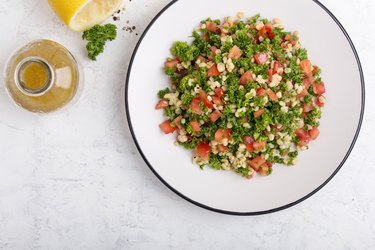
Tabouli is a traditional Middle Eastern salad prepared from minced parsley and mint leaves, bulgur, olive oil, chopped tomatoes and cucumbers and seasonings such as garlic, red or green onions and lemon juice.
Best made at least 30 minutes to one day in advance and refrigerated to develop maximum flavor, tabouli can be served with pita bread and hummus, as an appetizer with crackers, wrapped in lettuce leaves or as a side dish for meat, poultry or seafood.
Video of the Day
Video of the Day
Tabouli and Heart-Healthy Fats
Tabouli may seem too high in fat to be healthy: A 1 cup serving of a typical tabouli recipe contains 170 calories, according to the USDA, with 69 percent coming from fat, or 13 total grams of fat.
Because the primary source of fat in the dish is olive oil, however, the majority — 11.5 grams — is from monounsaturated fat, a type of fat that helps decrease blood cholesterol, according to Mayo Clinic, which can lead to a decreased risk of stroke and heart disease. Tabouli also contains smaller amounts of polyunsaturated and saturated fat.
Consider Fiber and Protein
A 1-cup serving of tabouli contains 13 grams of total carbohydrates. Four grams of these carbohydrates are supplied by dietary fiber, an amount that is 11 percent of the daily requirement of fiber for a healthy man and 16 percent of the recommendation for a woman, according to the National Academies of Sciences. The rest of the carbohydrates in a serving of tabouli are primarily supplied by starch.
Tabouli is not a rich source of protein, with 2 grams in each 1-cup serving. The protein in tabouli does not consist of all the amino acids your body needs and is therefore considered an incomplete source of the nutrient. According to the FDA, most plant foods fall in the category of incomplete proteins.
Tabouli can still play a role in a balanced diet containing adequate protein as long as you include protein-rich animal products or a variety of whole grains, beans, legumes, fruits and vegetables into your diet daily.
Boost Your Vitamins and Minerals
Men should have 90 milligrams of vitamin C each day, while women need about 75 milligrams, according to the National Academies of Sciences. Each cup of tabouli prepared from a basic recipe provides over 20 percent of this requirement for both men and women.
A diet high in vitamin C may lower your risk of cancer, osteoarthritis, hypertension and heart disease. Tabouli is also a good source of vitamin A, a nutrient that's vital for proper eye and immune system function.
Tabouli is a good way to include iron, calcium, potassium and copper in your diet. Together, these minerals build and maintain strong bones, support the health of your immune system and aid in the synthesis of red blood cells.
Tabouli can be high in sodium, with a 1-cup serving containing 450 milligrams, or 20 percent of the sodium a healthy adult should limit himself to each day, according to the American Heart Association. When you're making tabouli at home, avoid adding salt to keep your sodium intake under control.
- Mayo Clinic: "The Skinny on Fats"
- USDA National Nutrient Database: "Tabouli Salad"
- National Academies of Sciences: "Macronutrients"
- FDA: "Protein"
- National Academies of Sciences: "Vitamins and Minerals"
- American Heart Association: "How Much Sodium Should I Eat Per Day?"
- Australian Government Department of Health and Aging: Vitamins and Minerals
- Centers for Disease Control and Prevention: Most American Should Consume Less Sodium